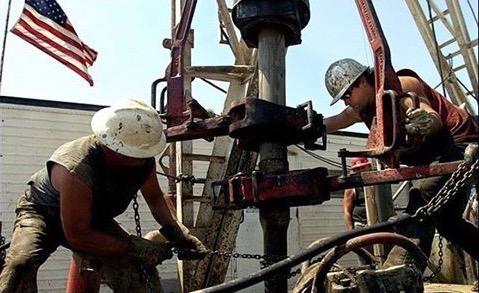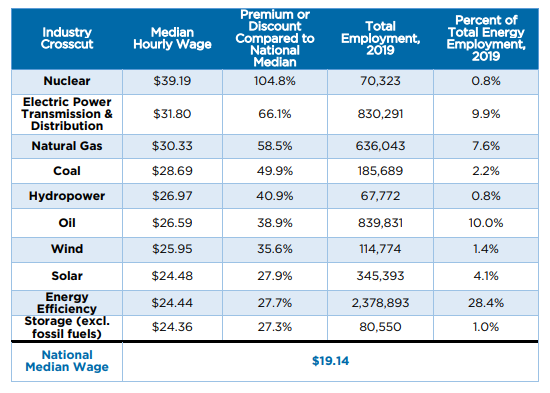Why Oil & Gas Workers Aren’t Too Keen on the ‘Just Transition’ Narrative

With their industry under assault, oil and gas workers are being assured they can simply transition to renewable energy jobs. John Kerry even recently quipped that oil and gas workers “can be the people who go to work to make solar panels.” Easy peasy, apparently.
So why is this “just transition” narrative being met with deep skepticism and even anger from oil and gas workers? Because the notion that a simple “transition” to jobs that typically pay less – or don’t even exist at all – is as misguided as the belief we can quickly pivot to 100 percent renewable energy.
A recent Energy Information Administration report provides a reality-check, finding the United States will likely continue to rely on oil and natural gas for just under 70 percent of its energy needs through at least 2050. Despite all the talk of the “end of oil” the EIA forecasts that “petroleum remains the most-consumed fuel in the United States” for decades. Department of the Interior Secretary Deb Haaland recently echoed the report’s findings, testifying, “There’s no question that fossil energy does and will continue to play a major role in America for years to come.”
So contrary to the “just transition” narrative, a robust U.S. oil and gas industry workforce will be needed for years to come – including Illinois’ proud oil and gas workforce.
Though most folks probably don’t think of Illinois as a major oil and gas industry state, a recent Texas Independent Producers & Royalty Owners Association (TIPRO) report serves as a reminder that the Land of Lincoln is home to four refineries, the second-largest crude oil storage facility in the country and an oil production industry that dates back more than a century. TIPRO finds the Illinois oil and gas industry generated $22 billion in economic activity last year, three percent of the state’s overall economy. The report also finds there were not only 16,000-plus oil and gas jobs in Illinois last year – 10th most in the country – but that those jobs paid an average salary of more than $104,000, 65 percent higher than the private sector average.
No wonder Illinois oil and gas workers aren’t clamoring to “transition” to renewable energy industry jobs that pay less and are far more temporary in nature. As Politico reported this week, a new report by the National Association of State Energy Officials (NASEO), the Energy Futures Initiative, and BW Research Partnership finds that, “Workers in the greener side of the energy industry earn significantly less than those who extract fossil fuels and run power plants…”
The report finds that U.S. oil industry workers earn a median wage of $26.59 per hour, while oil workers in the mining/extraction sectors specifically have a median wage of $37.67 per hour. The median wage for wind and solar industry workers is $25.95 per hour and $24.48 per hour, respectively.
 U.S. Bureau of Labor Statistics data show the most abundant U.S. “green” energy occupations – wind turbine technician and solar panel technician – pay $53,000 and $43,000 per year, respectively, both tens of thousands of dollars less than what the typical oil and gas worker makes. More than two-thirds of solar panel installation jobs are also temporary contract-based positions. These are just a few reasons why a recent survey of by a group of trade unions finds oil and gas jobs are viewed by skilled tradespeople as better paying and better long-term employment prospects than their renewable energy counterparts.
U.S. Bureau of Labor Statistics data show the most abundant U.S. “green” energy occupations – wind turbine technician and solar panel technician – pay $53,000 and $43,000 per year, respectively, both tens of thousands of dollars less than what the typical oil and gas worker makes. More than two-thirds of solar panel installation jobs are also temporary contract-based positions. These are just a few reasons why a recent survey of by a group of trade unions finds oil and gas jobs are viewed by skilled tradespeople as better paying and better long-term employment prospects than their renewable energy counterparts.
And when suggesting oil and gas workers can just go make solar panels, Kerry failed to mention that just one percent of solar panel manufacturing occurs in the United States. China (surprise, surprise) dominates the renewable infrastructure manufacturing industry and also has a near monopoly on the minerals that must be mined to manufacture renewable energy infrastructure. As Politico recently reported, “It’s a dirty truth. The U.S path to clean energy goes straight through China. … which controls a vast share of the minerals used in electric batteries, the cheap materials that make up solar panels and the guts of wind turbines.”
Common sense tells us we are going to need a lot of oil and gas for many years to come and that it’s imperative to produce as much of it here in the United States as possible. That cannot happen without the continued presence of a robust, experienced and skilled U.S. oil and gas industry workforce. That is why the “just transition” narrative is not only being met with skepticism by oil and gas workers, but a lot of pragmatic observers, in general.
